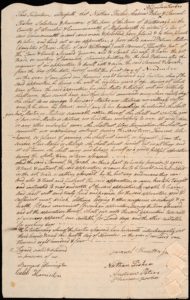
As you read the transcription of the contract below, consider the following questions:
- What is considered important for Patience Miller to learn and how is she expected to behave? What will her life be like under the terms of the contract?
- What do the masters have to gain from the arrangement? What do they have to lose?
- What does the contract tell us about the town of Westborough and its inhabitants at the time? What social dynamics need to be in place to make such a system of child welfare successful?
Transcription:
This Indenture witnesseth, that Nathan Fisher, Andrew Peters, Phinehas Forbes & Samuel Fisher, Selectmen & Overseers of the poor of the town of Westborough in the County of Worcester & Commonwealth of Massachusetts, by virtue of a law of said Commonwealth in such cases made & provided, have placed, & by these presents do place, and bind out as an apprentice, a poor child named Patience Miller (daughter of Persis Miller of said Westborough) unto Samuel Thurstin, Junior of the Town & County aforesaid Yeoman, and to Sarah his wife, to learn the art, trade, or mistery of housework, spinning, knitting, etc. The said Patience after the manner of an apprentice to dwell with & serve the said Samuel & Sarah, from the day of the date hereof until the first day of November in the year of our Lord one thousand eight hundred and fourteen, when if the said apprentice be living, she will be eighteen years of age, during all which term of time the said apprentice her said Master & Mistress, well and faithfully shall serve, their secrets keep, and their lawful commands every where readily obey. She shall do no damage to her said Master, nor Mistress, nor willingly suffer any to be done by others: and if any to her knowledge be intended, she shall give Her said Master, or Mistress seasonable notice thereof, she shall not waste the goods of her said Master or Mistress, nor lend them unlawfully to any, at cards, dice, or any other unlawful game she shall not play, Fornication she shall not commit, nor matrimony contract, during the said term, Taverns, Ale-houses, or places of gaming, she shall not haunt, or frequent: From the service of her Master or Mistress, she shall not absent herself, but in all things and at all times, she shall carry and behave herself as a good & faithful apprentice during the whole time, or term aforesaid. — — — — — — — — —
And the said Samuel, & Sarah, on their part do hereby promise, & agree to teach & instruct, the said apprentice, or cause her to be taught and Instructed in the art, trade or calling aforesaid, but the best way and means they can: And also to teach and instruct the said apprentice, or cause her to be taught and instructed to read and write if the said apprentice be capable to learn: And shall well and truly find and provide for the said apprentice good & sufficient meat, drink, clothing, lodging & other necessaries, in sickness & in health, fit and convenient for such an apprentice, during the term aforesaid, and at the expiration thereof, shall give unto the said apprentice two suits of wearing apparel, one suitable for Lords days, and the other suitable for working days — — — — — — — — — — — —— —
In testimony whereof the parties aforesaid have hereunto interchangeably set their hands & seals this twelfth day of November in the year of our Lord one thousand eight hundred & four — — — — — — —
Signed, sealed & delivered in presence of us
Samuel Thurston, Jr
Barnard Harrington
Nathan Fisher
Caleb Harrinton
Andrew Peters
Phinehas Forbes
Patience Miller and Her Family
Patience Miller’s indenture contract (below) is more typical than Stephen Pratt‘s in that it spells out in some detail the conduct and behavior expected from the child during the apprenticeship, as well as what the masters were required to provide for the child. The set of expectations in Patience Miller’s contract commonly appear in others from Westborough and generally applied to both girls and boys and to masters. “Husbandry” (or farming) was the assigned trade for every boy in Westborough, whereas girls were taught sewing, knitting, spinning, and other activities associated with running a household.
Shortly after Patience Miller was bound out to Samuel and Sarah Thurstin, her sister, Freelove Miller, was also bound out on January 1, 1805 to Aaron and Asenath Harrington. The contract for Freelove states that her mother, Persis Miller, “is thought by said overseers to be unable to maintain her.”
As part of the agreement, the Selectmen agreed to pay the Harringtons $100 in five installments payable at the end of each year ($20), as long as Freelove is still alive and under their care through that period. Such a generous provision was most likely due to the fact that Freelove was only two years old at the time the contract was signed, so the payments were meant to cover the expense of raising her until she could become a more productive member of the household.
Go to the next page in the exhibit: Lyman School for Boys – Childhood in the Nineteenth Century.
* * *
Exhibit Navigation for “Changing Pictures of Childhood: A Comparative History of Child Welfare in Westborough”: